This memorial website was created in memory of our loved one, Carson Kan, . We will remember him forever.
A Celebration of Life in Honor of Carson E. Kan
Dearest friends and family,
Let us lift our hearts and raise our glasses in a celebration of life in honor of Carson E. Kan!
Most importantly, please come prepared to share your favorite stories and memories to spread the joy, laughter, and love that Carson brought to us all!
Casual attire
RSVP: Edi Sanford - (650) 867-8222, edi_sanford@yahoo.com
Looking forward to sharing the warmth and love of family and friends!
When:
Saturday, May 20
from 1:00 PM to 5:00 PM
Where:
Stanford Faculty Club
439 Lagunita Dr
Stanford, CA 94305
Tributes
Leave a tributeCarson has always had a big heart, and it was evident in the love he shared with Edi, his family and friends. We were deeply saddened when Carson was diagnosed with cancer 40 years ago and had to endure horrific chemo and radiation which compromised his health. Yet, we watched with amazement how Carson survived his tribulations, never complaining -- with remarkable courage.
Inspite of his health challenges, Carson sought to help others in need....always being sensitive to their challenges. Most recently, Carson reached out to my brother Tim who was diagnosed with colon cancer and passed a year ago. Carson's caring and compassion touched our hearts....For despite how difficult life had become for him, he travelled five hour round trips to encourage and support my brother.
A family member recently shared a quote from a 1981 article by our dear cousin Carson:
“Second Chance to Live"
“Having cancer teaches you how to live. I try to live my life so that if I die tomorrow, I’ll minimize the regrets. If there’s a problem that’s not resolved, I want to resolve it. I won’t let you or me get away with bad feelings hanging in the air between us.”
Carson’s quote is a lesson which inspires me. Each day is a blessing, and I wish to live each day loving and caring for others and without regret. God bless you, Carson. You now reside in God's kingdom, and you will forever be in our hearts.
And God bless you, Edi, for being a beautiful, loving soulmate who has enriched all our lives. And our heartfelt sympathies to Carson's beautiful family Aunt Marge, Uncle Hank, Russell, Patty, Forrest and family. Love, Karen
Halloween took on a whole new meaning after college, seeing adults getting all dressed up! I'll never forget my first Halloween at HP. During the parade he came to my cubicle, I was on the phone and he sat on my lap. He was dressed as a baby; wearing nothing but a diaper, a bonnett and a pacifier in his mouth! Priceless performance from Carson, always engaging, fun and witty! I am so grateful to have had his light heart in my life!
"I will miss you my dear friend! Although, we didn't keep in touch near the end, I have and will always have a place in my heart for you! Rest in Peace Carson".
Joyce and I say "Thank you for being Carson". We are so fortunate we had you in our lives.
The last time I saw him it was after he retired, and you joined us at the best American sushi place I'd ever eaten at. I felt so loved! You two were always so lovely together.
To Carson I say so long and thanks for all the fish, I have my towel and will see you soon.
(met at HP in the 90's, will never forget him, so glad he lasted 70 years! So many people blessed.)
Leave a Tribute
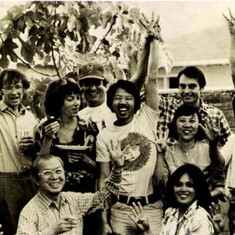
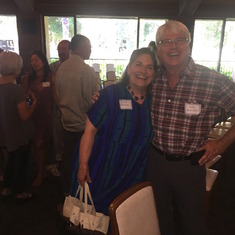
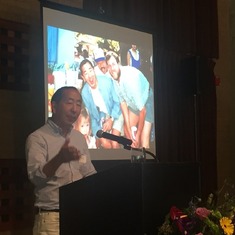
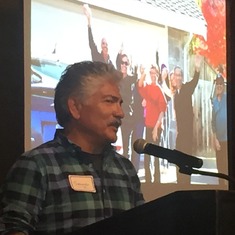
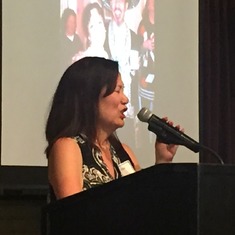
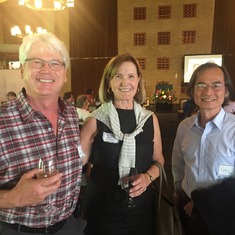
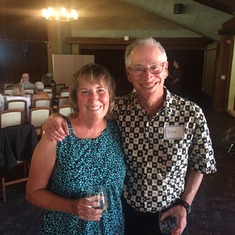
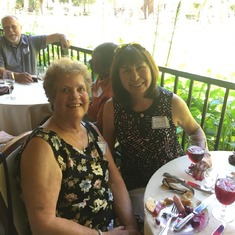
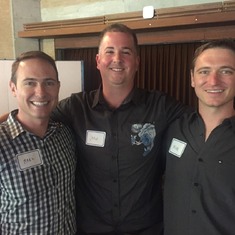
HP Measure Magazine May-June 1981
Up Front - Comments on the changing HP scene – and the people behind it
The story of Carson Kan‘s recovery from cancer (“Second chance to live,“ pages 3-6), and his subsequent efforts to counsel and comfort others afflicted with the disease contains a note with an increasingly familiar ring ~- finding himself attended by medical equipment produced by his own company The story is told by Shirley Gilbert, editor-communicator for Data Terminals Division in Sunnyvale, California.
After six hours on the operating table for his second operation, Carson awoke to discover so many instruments attached to his body that “i played count-the-tubes." He noticed that much of the equipment was HP-made.
Carson Kan - Second Chance to Live
The boyish Chinese chap with the moustache stands at attention in the local Chinese restaurant with several menus in his hand. He courteously shows me to a table and I turn to look tor Carson Kan, the HP employee I'm supposed to meet for lunch. Suddenly the man with the menus slides into the booth across from me.
“Hi, I'm Carson Kan,” he says with an impossible grin that shows he’s pleased with his prank.
Carson, a project manager at the Computer Systems Division in Cupertino, California, and with HP tor 12 years, is known for just this kind oi quick wit, his rapid-tire one-liners and an irrepressible sense of fun.
Today we’ve met to discuss a more serious subject: cancer. Five years ago, at age 29, Carson discovered he had testicular cancer.
“Where was I at the time? I was into the American dream,” says Carson, “the good-ole, middle-class American dream. You know the one. Get a wife. Get a house. Get kids. The dream didn’t say anything about getting cancer.”
When doctors discovered the cancer and removed a testicle, Carson still wasn’t too worried, “I figured they would give me a pill. I had already had an operation, so I thought I just needed a little more treatment, and I would be cured.”
That was in March 1976. Later, doctors found a “questionable” lymph node and decided on radiation therapy first, then an operation to re-move the lymph nodes, followed by more radiation therapy The radiation treatment exhausted and nauseated Carson, but he dragged himself to work tor about tour hours every day. Then came the six-hour operation.
After that it looked like Carson was going to be just fine. His cancer, doctors said, was in remission and Carson assumed he could go on with his life.
A year later, after Carson completed his monthly series oi tests, his doctor asked him to come into his office. “How much vacation time do you have, Carson’?‘ the doctor asked i told him and he said, ”Take it all, Carson. The cancer has spread to your liver. You don’t have much time.’
The news hit Carson like a ton of bricks. it was his first encounter with the word ‘terminal.’ “1 cried and cried,“ said Carson of that bitter moment, “and in my mind I kept thinking ‘You're going to die, Carson, you're really going to die.’ In a kind of trance, he stumbled to the hospital's human support office and talked with counselor Dan Dugan. “I remember I rambled and rambled and he listened. He really listened. He didn‘t give me advice or tell me how to feel. He felt all this pain with me.“
Next Carson began chemotherapy, a series of potent drugs designed to knock out the cancerous cells. He went from bad to worse after the treatments: pain, fever, sweating and weight loss. Carson's doctor decided to try a then-experimental therapy involving three strong medications. The treatment is especially painful and Carson seemed to suffer every side effect in the book. His white blood cell count went way down. He lost more weight (he weighs 140 pounds when he’s well, but he dropped to 79 after the treatment). He had a perpetual sore throat and couldn't eat a thing. He even got pneumonia.
“I could see how l looked,” says Carson, “by looking at others. People would look at me in a weird way and when I looked in the mirror I started crying.“
The treatment had almost taken too much out of him. The hospital sent him home to recuperate and slowly Carson saw himself improving. He couldn't believe it at first. “My gauge was my weight. I gained a little weight and when I saw that, I forced myself to eat even though it was painful.“
Carson also tried to help the healing process along by using positive mental images. He got the idea from a book called Getting Well Again. Carson had to mentally picture some powerful force healing him. “At first I thought of the Hoover Dam, That seemed very powerful to me. And I pictured myself on this table - sort of like a Boris Karloff movie setting - and then a giant switch was thrown and the electricity went through my body and I was cured."
But that was too Hollywoodish for Carson. He decided he would visualize a cure more effectively if he could imagine his white blood cells multiplying and the cancerous cells being destroyed. To do that, he went to El Camino Hospital, where all the tests had been taken, and asked to see his cells. “They were hesitant,” recounts Carson, “but I insisted and finally they let me see them. Once I saw them, I pictured the white cells getting stronger and the cancer cells dying. I did this two or three times a day"
But the moment of greatest hope for recovery came when Carson returned to his office in HP's Cupertino complex. His father tried to help Carson up the steps, but that was something he wanted to do on his own. “I walked, well, I barely walked to my desk and sat there for two or three hours. I was ecstatic. I never thought I’d ever be back there again. People dropped by to visit. It was a great, positive environment for me. I knew from then on that I was on a roll, that I would make it.“
From there Carson went from looking very sick, to looking almost well, and then gaining enough weight to be called well again. “I went back to my doctor," says Carson, “and he assured me i wasn’t dying. He told me I didn’t need any more treatments. I was amazed.”
What was it that cured Carson?
“Western medicine," says Carson, “let me get to the point where I could take care of myself. The chemotherapy gave me time.” But Carson also believes that it was the huge, loving army of friends, co-workers and relatives praying and hoping for him that helped with the cure. The network of concern - both inside and outside HP - was incredible to him.
Some Filipino friends offered him a round-trip ticket to the Philippines to undergo psychosurgery there. He chose not to accept their offer. Whole congregations prayed for Carson’s recovery Meditation groups offered their energy in his behalf. “I figured at one point there were at least 1,000 people wishing me well.“ says Carson. “HP friends would ask, ‘Do you mind if we pray for you?’ ‘Hell no! Go ahead,’ I said. ‘Can we offer candles in your behalf?’ Great] I'd say, ‘Go to it: There was so much positive energy around."
Carson admits the cancer has changed him a great deal.
“Before,” he says. “l always had the world exactly where it was supposed to be. l knew where l was going. I never cried.” Now he sheds tears whenever he feels like it.
Carson also listens and talks to others with cancer. He has become a counselor and lecturer to others who suffer from the illness. “After l was okay tor awhile, a friend asked me to talk to his buddy who had cancer. Then other people started calling - friends of relatives and relatives of: friends - and we shared and compared notes.”
Al Steiner general manager of the newly renamed Colorado Telecommunications Division on the move to Colorado Springs (formerly Mountain View's Delcon Division); is one HP employee who feels he has been greatly helped by Carson’s counseling.
Al discovered a year ago that he had the same type of illness that Carson had. He went through the same arduous chemotherapy sessions and almost died from them At home. recuperating, Al met with Carson.
“He: came and talked to me and my wife, Barbi and. it was just great. Carson told me what was normal and, yes, admitted I was having the same feelings. It was a great relief to me. Here was someone who had the same thing 1 had and he was fat and sassy, sitting in front of me making terrible jokes, very much alive and well.”
At times the counseling is depressing, admits Carson. “I’d want to cry, give up. “Losing anyone still gets me down.” But now he sees more and more survivors.
Carson lectures at Stanford Hospital in Palo Alto, El Camino Hospital in Mountain View. the University of Santa Clara and Kaiser Hospital in Santa Clara. He helps others by relating his experiences as patient and survivor.
Having cancer, according to Carson, teaches you how to live. “I try to live my life," he concludes. “so that if I. die tomorrow I'll minimize the regrets. If there's a problem that’s not resolved, I want to resolve it. I won't let you or me get away with bad feelings hanging in the air between us."
At lunch in the restaurant Carson energetically spears a prawn with a fork on the large dish in front of him.
A fork with his Chinese background?
Carson grins. "Chinese people never use chopsticks it they're eating off American plates," he says mischievously Then he digs into the food with great gusto.

